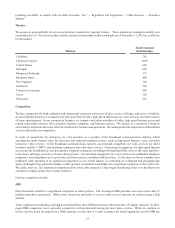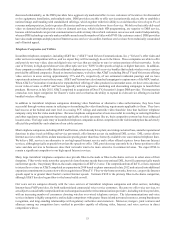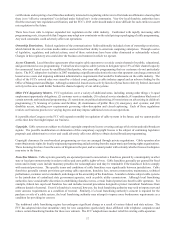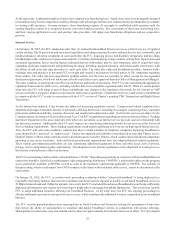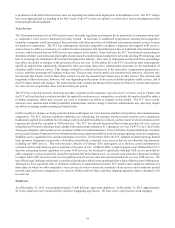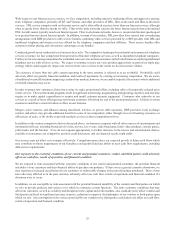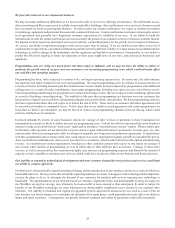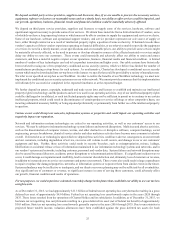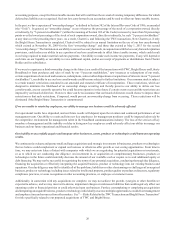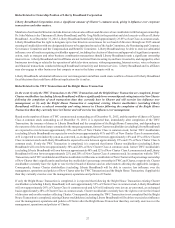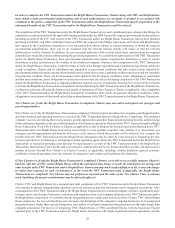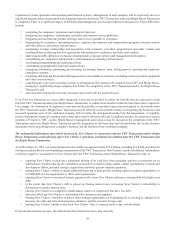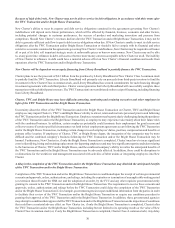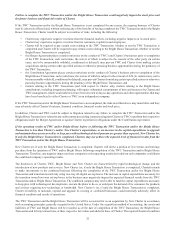Charter 2015 Annual Report Download - page 37
Download and view the complete annual report
Please find page 37 of the 2015 Charter annual report below. You can navigate through the pages in the report by either clicking on the pages listed below, or by using the keyword search tool below to find specific information within the annual report.22
Some of our outstanding debt is subject to change of control provisions. We may not have the ability to raise the funds necessary
to fulfill our obligations under our indebtedness following a change of control, which would place us in default under the
applicable debt instruments.
We may not have the ability to raise the funds necessary to fulfill our obligations under our notes and our credit facilities following
a change of control. Under the indentures governing the CCO Holdings' notes and CCOH Safari notes, upon the occurrence of
specified change of control events, the debt issuer is required to offer to repurchase all of its outstanding notes. However, we may
not have sufficient access to funds at the time of the change of control event to make the required repurchase of the applicable
notes, and Charter Operating is limited in its ability to make distributions or other payments to any debt issuer to fund any required
repurchase. In addition, a change of control under the Charter Operating credit facilities would result in a default under those
credit facilities, which would trigger a default under the indentures governing the CCO Holdings' notes and CCO Safari II notes.
Because such credit facilities and notes are obligations of Charter Operating and its subsidiaries, the credit facilities would have
to be repaid before Charter Operating's assets could be available to CCO Holdings or CCOH Safari to repurchase their notes. Any
failure to make or complete a change of control offer would place CCO Holdings or CCOH Safari in default under their notes.
The failure of our subsidiaries to make a change of control offer or repay the amounts accelerated under their notes and credit
facilities would place them in default under such agreements.
Risks Related to Our Business
We operate in a very competitive business environment, which affects our ability to attract and retain customers and can
adversely affect our business, operations and financial results.
The industry in which we operate is highly competitive and has become more so in recent years. In some instances, we compete
against companies with fewer regulatory burdens, better access to financing, greater personnel resources, greater resources for
marketing, greater and more favorable brand name recognition, and long-established relationships with regulatory authorities and
customers. Increasing consolidation in the cable industry and the repeal of certain ownership rules have provided additional
benefits to certain of our competitors, either through access to financing, resources, or efficiencies of scale. We could also face
additional competition from multi-channel video providers if they began distributing video over the Internet to customers residing
outside their current territories.
Our principal competitors for video services throughout our territory are DBS providers. The two largest DBS providers are
DirecTV (which is owned by AT&T) and DISH Network. Competition from DBS, including intensive marketing efforts with
aggressive pricing, exclusive programming and increased HD broadcasting has had an adverse impact on our ability to retain
customers. DBS companies have also expanded their activities in the MDU market.
Telephone companies, including two major telephone companies, AT&T and Verizon, offer video and other services in competition
with us, and we expect they will increasingly do so in the future. Upgraded portions of these networks carry two-way video, data
services and provide digital voice services similar to ours. In the case of Verizon, FIOS high-speed data services offer speeds as
high as or higher than ours. In addition, these companies continue to offer their traditional telephone services, as well as service
bundles that include wireless voice services provided by affiliated companies. Based on our internal estimates, we believe that
AT&T (excluding DirecTV) and Verizon are offering video services in areas serving approximately 35% and 4%, respectively, of
our estimated residential passings and we have experienced customer losses in these areas. AT&T and Verizon have also launched
campaigns to capture more of the MDU market. When AT&T or Verizon have introduced or expanded their offering of video
products in our market areas, we have seen a decrease in our video revenue as AT&T and Verizon typically roll out aggressive
marketing and discounting campaigns to launch their products. Additionally, in July 2015, AT&T completed its acquisition of
DirecTV, the nation’s largest DBS provider and in connection with that acquisition, AT&T committed to expand fiber to the
premises services to 12.5 million locations. This transaction created an even larger competitor for Charter’s video services that
has the ability to expand its video service offerings to include bundled wireless offerings.
Due to consumer electronic innovations, content owners are allowing consumers to watch Internet-delivered content on televisions,
personal computers, tablets, gaming boxes connected to televisions and mobile devices, some without charging a fee to access the
content. Technological advancements, such as video on demand, new video formats, and Internet streaming and downloading,
have increased the number of entertainment and information delivery choices available to consumers, and intensified the challenges
posed by audience fragmentation. For example, online video services continue to offer consumers alternatives including Hulu,
Netflix, Amazon and Apple. In 2015, HBO and CBS began selling their programming direct to consumers over the Internet. DISH
Network launched Sling TV which includes ESPN among other programming, and Sony launched PlayStation Vue which includes
85+ TV channels. The increasing number of choices available to audiences could also negatively impact advertisers’ willingness
to purchase advertising from us, as well as the price they are willing to pay for advertising.


